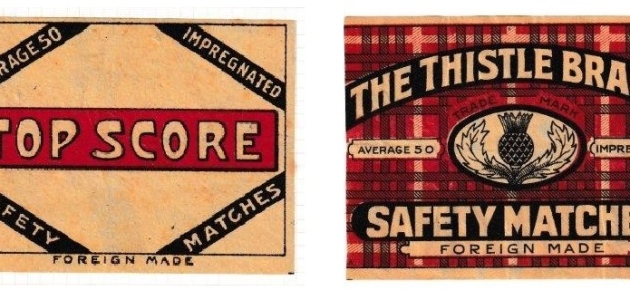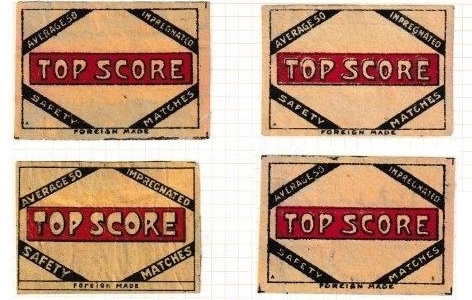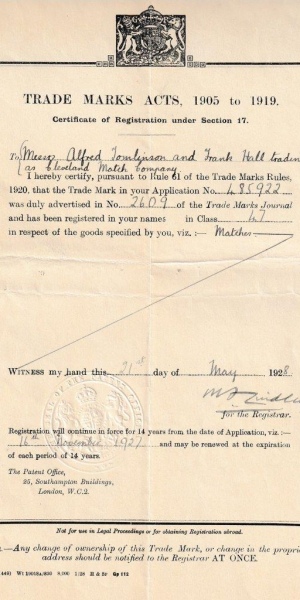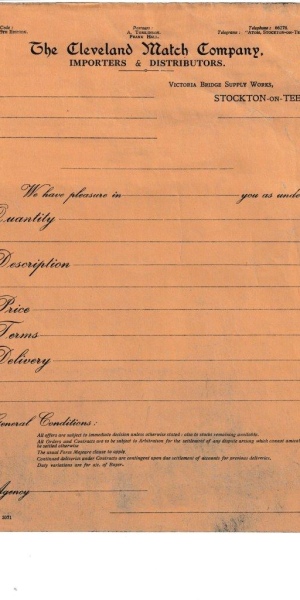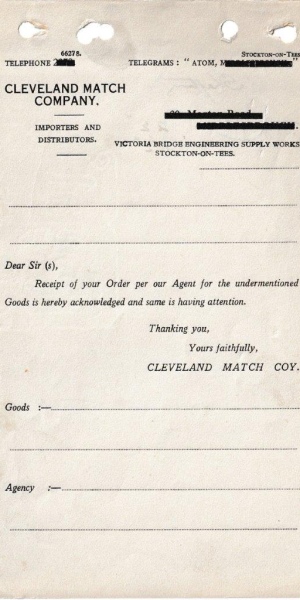
Exhibitor : Alan Middleton
The Cleveland Match Company operated as match importers and wholesalers from 1925 to 1935, initially in 29 Marton Road Middlesbrough and then in Boathouse Lane in Stockton-on-Tees. This Exhibit tells the story of the growth and subsequent decline of their business and the three match brands that they imported during their ten years of operation.
The beginning, Thistle brand
Alfred Tomlinson had started a small iron and coal business in Middlesbrough in 1919. He was joined in 1921 by Frank Hall and the business expanded into concrete and scrap metals. Then in 1925 they ventured into match importation and formed a subsidiary called The Cleveland Match Company.

The first brand they imported was “The Thistle” which came boxed and labelled directly from the Belgian suppliers.
The matches were stored in bonded warehouses, ready for distribution to the retailers by a network of representatives.
These men were paid a commission on the volume of sales made.
Russian matches, Top Score brand

During 1927 the company introduced the “Top Score” brand from Russia and applied for the Trade Mark which was granted in 1928. Russian matches were very competitively priced compared to British-made matches, and this led to Cleveland Match switching Thistle to Russian suppliers.
The threat from Russian imports by Cleveland and other match companies was so serious that it prompted a question in Parliament on 5th July 1928. Concerns were expressed that the public were being deceived about the origin of matches, and Thistle was explicitly mentioned as an example of a product that used a British emblem. H M Customs immediately insisted on more explicit labelling on imported matchbox labels, which can be seen on the labels here.
In the early 1930s the words “Foreign Made” started being used, to conceal the Russian origin. and to overcome the adverse public reaction to Russian goods. Problem solved for the British smoker who didn’t know what he was buying but hard lines on the commercial viability of the British match manufacturers at the time!
Tartan and “Top Score” brands
In 1928 the “Tartan” brand started being imported from Belgium and carried the company’s name (as C M C), The Belgians also supplied a very attractive “Top Score” label which also carried the company name and the Middlesbrough address. But in 1929 the company moved to bigger and better premises in nearby Stockton-on-Tees which meant that the Middlesbrough labels were no longer usable.
Closure in 1935
Cleveland Match never issued ‘own-brand’ advertising labels, unlike their competitors such as the Middlesbrough-based importers S.J.Endean Rowe/Nectar Match Co. The early 1930’s were very hard times, and the depression was at its height. The British Match Corporation had been formed in 1927 and this made it very difficult for independent match merchants to survive. Finally, after experiencing supply problems with Russia and the cut-throat competition the partners reluctantly decided to run down the match business and concentrate on the fast-developing light engineering side of their business.
Here are a few company letterheads and business documents which serve to illustrate the history of this short-lived much-loved British company.
Cleveland’s parent company Tomlinson Hall & Co. Ltd. continues to trade, and now operates out of Billingham. Tomlinson, Hall & Co. became Tomlinson, Hall & Co. Ltd in 1954 and they have now been in business for over 100 years.
Click here to return to the Exhibition Catalogue.


